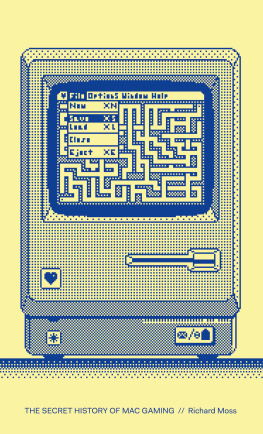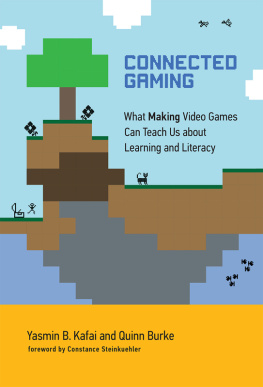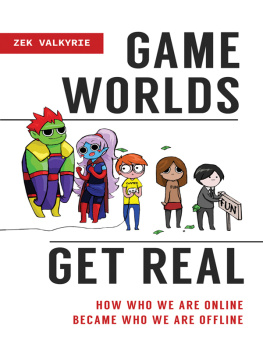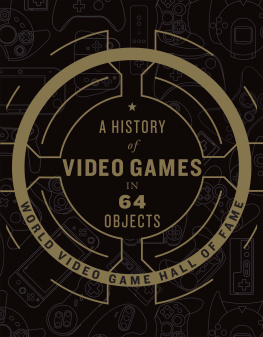A WORLD OF EXCESSES
A World of Excesses
Online Games and Excessive Playing
FALTIN KARLSEN
The Norwegian School of Information Technology, Norway
First published 2013 by Ashgate Publishing
Published 2016 by Routledge
2 Park Square, Milton Park, Abingdon, Oxon OX14 4RN
711 Third Avenue, New York, NY 10017, USA
Routledge is an imprint of the Taylor & Francis Group, an informa business
Copyright Faltin Karlsen 2013
Faltin Karlsen has asserted his moral right under the Copyright, Designs and Patents Act, 1988, to be identified as the author of this work.
All rights reserved. No part of this publication may be reproduced, stored in a retrieval system or transmitted in any form or by any means, electronic, mechanical, photocopying, recording or otherwise without the prior permission of the publisher.
Notice:
Product or corporate names may be trademarks or registered trademarks, and are used only for identification and explanation without intent to infringe.
British Library Cataloguing in Publication Data
Karlsen, Faltin.
A world of excesses : online games and excessive playing.
1. Internet games--Social aspects.
I. Title
306.4'87-dc23
The Library of Congress has cataloged the printed edition as follows:
Karlsen, Faltin.
A world of excesses : online games and excessive playing / by Faltin Karlsen.
pages cm
Includes bibliographical references and index.
1. Internet games--Social aspects. I. Title.
GV1469.15.K37 2013
794.8--dc23
2012051553
ISBN 9781409427636 (hbk)
Contents
List of Figures and Tables
Figures
Table
Acknowledgements
During the writing of this book I have received help and encouragement from several people and institutions and I am very thankful for their support. A great thank you to Aage Borchgrevink, Gunn Sara Enli, Asle Fagerstrm, Mark Griffiths, Kristine Jrgensen, Jan-Erik Larsen, Astrid Lied, Jonas Linderoth, Bjrn Olav Listog, Torill Elvira Mortensen and Trine Syvertsen for commenting on different parts of the manuscript. Thanks to Trude Westby for help with pictures. A special thank you to Torill and Kristine for their support in the final stage of the writing process. I would also like to thank Trond Brsum and Kim Johansen stby for great research assistance on different parts of the project.
This book was initiated as a smaller project in 2009, where I interviewed players of online games. This project received research funding from within the Norwegian Media Authority. I later received a grant from the Norwegian Ministry of Culture to map research related to problem gaming and problem gambling. I would like to express my thanks to both these institutions for generous funding for my research. I would also like to thank the institution I work at, The Norwegian School of Information Technology, for providing great working conditions. A special thank you to our Dean, Bjrn Hanssen for encouragement and support during the whole process.
I have also received valuable feedback on papers and presentations on conferences and smaller workshops. I would like to take this opportunity to thank participants from the networks HIGs and MRRN. Earlier versions of this book have been presented at different conferences, including: Internet Research 11.0 in Gothenburg, at Cyberpsychology and Computer Psychology (CyComP2010) in Bolton, at NordMedia in Karlstad, at DiGRA 2011 in Hilversum, at NordMedia in Akureyri and the biennial conference for Norwegian media researchers in lesund. I would like to thank reviewers and participants who have commented on papers or presentations.
Part of this book has been published in earlier versions:
To be more precise, the funding was from a research council within the media authority called Rdet for anvendt medieforskning (council for applied media research).
Original title in Norwegian: Kartlegging av problemskapende onlinespilling.
Chapter 1
Introduction
This book is about games and gaming culture and will address one of the recent and most debated topics in relation to computer games: the possibility of becoming addicted to online games. By online games I am referring to the genre known as Massively Multi-Player Online Roleplaying Games (MMORPGs), where World of Warcraft (2004) is a well-known title. These games are often set in fantasy universes where magic and heroic deeds have a prominent place. A central objective is to develop an avatar through which the player can explore vast expanses of land, in a game universe populated by thousands of other players. Cooperation is common, sometimes a prerequisite, and players often band together to engage in challenging tasks. The game worlds are persistent, and the player can spend months, or years, without exhausting the possibilities they offer. Tight bonds are often forged between players.
These games typically reach the attention of the general public when something has gone terribly wrong. From Asia we receive stories about players who are found dead in front of the computer after days of continuous playing. Teenagers quitting school or work in order to play are topics that are dealt with on a regular basis. One particularly disturbing news story was when South Korean police reported arresting a couple for starving their 3-month-old daughter to death while devoting their attention to an online game. Adding absurdity to an already dreadful story, the objective of the game was to raise a virtual character of a young girl (Tran 2010). The couple had reportedly lost their will to live a normal life because they had no jobs and had given birth to a premature baby.
These stories differ in gravity but share some characteristics, most notably that the games are depicted as holding a certain power over their users to such an extent that they are sometimes turned into game addicts. The public debates concerning this issue are often heated and the positions polarised. Some accuse online games of being cunningly designed compulsion machines that force youngsters to play endlessly. Others praise online games for containing rich and immersive gameplay, and vigorously defend them as just another albeit more time consuming type of computer game. Within the research community the tone is subtler, the arguments more elaborate, but the same positions are also present here.
Computer game playing in general is a complicated matter to approach, as playing, like overall media use, is ingrained within layers of psychological, social and cultural context. Political, economic and technological aspects also influence how games are developed, distributed and used. Playing, therefore, concerns a large number of theoretical and empirical matters and crosses several academic fields.
When we narrow the topic to excessive playing or online game addiction, contributions from two research areas are especially relevant, namely psychology and game studies. And they are relevant for different reasons: game studies because of a context-sensitive focus on games and playing; psychology because of its focus on problematic sides of gaming. These research areas will be the basis for this book, where the aim is to engage a cross-disciplinary discussion regarding what is often referred to as online game addiction.








